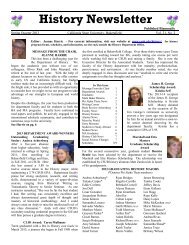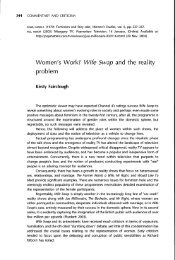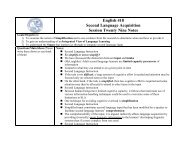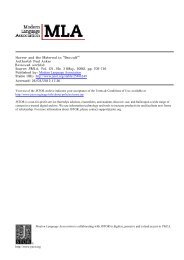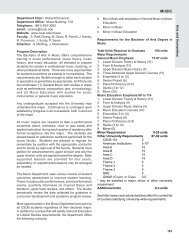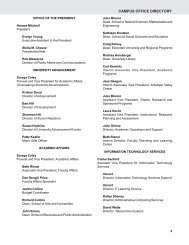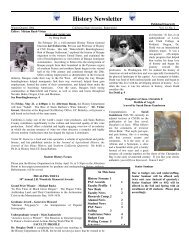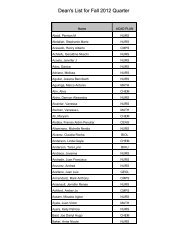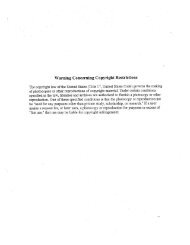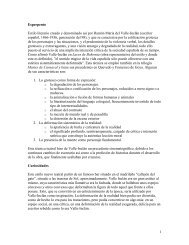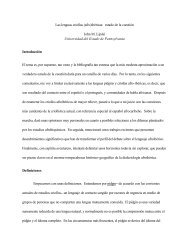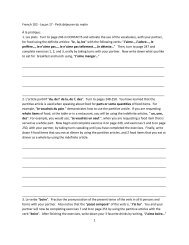''Don't Ask me, I'm Just a Girl'': Feminism, Female Identity, and The ...
''Don't Ask me, I'm Just a Girl'': Feminism, Female Identity, and The ...
''Don't Ask me, I'm Just a Girl'': Feminism, Female Identity, and The ...
Create successful ePaper yourself
Turn your PDF publications into a flip-book with our unique Google optimized e-Paper software.
Don’t <strong>Ask</strong> <strong>me</strong>, I’m <strong>Just</strong> a Girl 283<br />
by a review of Hewlett’s book but more broadly examining the status<br />
of wo<strong>me</strong>n today, Michelle Goldberg bluntly claims ‘‘It is ti<strong>me</strong> for<br />
another backlash.’’ In a review of Hewlett’s book for Dissent, Ellen<br />
Willis similarly claims that ‘‘feminism is barely breathing.’’ As both<br />
Goldberg <strong>and</strong> Willis point out, Hewlett’s <strong>me</strong>ssage is a dire one for<br />
single <strong>and</strong> childless wo<strong>me</strong>n: reproduce now, before it’s too late or you<br />
will be reduced to a clinically depressed <strong>and</strong> ‘‘empty’’ being. It is<br />
remarkable that a full decade after the airing of ‘‘Selma’s Choice’’ <strong>and</strong><br />
the debates over Murphy Brown the sa<strong>me</strong> conversation about wo<strong>me</strong>n’s<br />
lives <strong>and</strong> bodies is taking place. In a prelude to a recent interview with<br />
Susan Faludi in Mother Jones, Sue Halpern writes:<br />
When Susan Faludi published Backlash in 1992, the mo<strong>me</strong>nt<br />
see<strong>me</strong>d ripe for a feminist revival. Bill Clinton had been elected,<br />
essentially by wo<strong>me</strong>n; Anita Hill had outed Clarence Thomas <strong>and</strong><br />
sparked a national discussion on sexual harass<strong>me</strong>nt <strong>and</strong> gender inequality<br />
in the workplace; <strong>and</strong> Washington had hosted the largest<br />
pro-choice rally ever assembled.<br />
Halpern offers an apt description of the era. <strong>The</strong> decade that followed<br />
indeed see<strong>me</strong>d to fulfill the promise of the ti<strong>me</strong>: we witnessed an<br />
increase of wo<strong>me</strong>n into the workplace as well as colleges, <strong>and</strong> more<br />
sexual liberation for many wo<strong>me</strong>n, visible in part in the large number<br />
of female-centered films <strong>and</strong> television shows, including HBO’s wildly<br />
successful Sex <strong>and</strong> the City. But by 2002, we see<strong>me</strong>d to have co<strong>me</strong> full<br />
circle. When Susan Faludi was writing her book, George Bush was in<br />
the White House; a decade later, another George Bush is in the White<br />
House, <strong>and</strong> the nation has largely retreated from the leftist political<br />
agenda of the Clinton administration. Looking back on the 1980s,<br />
Faludi saw a rollback of the many gains made by the feminist move<strong>me</strong>nt<br />
in the 1960s <strong>and</strong> 1970s; as she noted, prominent in the backlash<br />
was the belief that wo<strong>me</strong>n, biologically ‘‘destined’’ to bear <strong>and</strong> raise<br />
children, were doing the country a disservice by placing their own<br />
needs, desires, <strong>and</strong> careers ahead of family life. Ten years later, Hewlett’s<br />
book is offering the sa<strong>me</strong> argu<strong>me</strong>nt. <strong>The</strong> return to a traditionally<br />
conservative perspective is troubling; however, the situation is not<br />
completely the sa<strong>me</strong>. Looking back on the 1990s, it seems that the era<br />
is marked not so much by a backlash as it is by a continual questioning<br />
<strong>and</strong> contestation of existing ideologies that are almost constantly in



